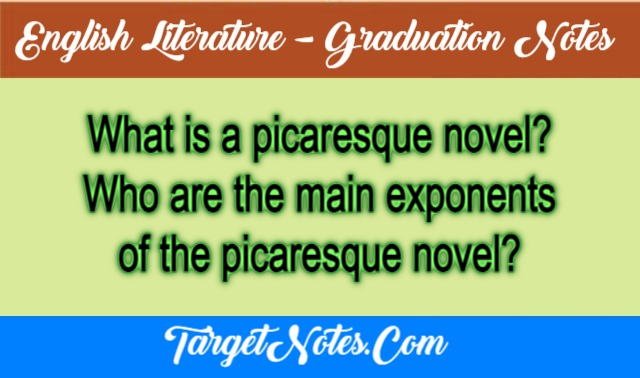
Contents
What is a picaresque novel? Who are the main exponents of the picaresque novel?
Or
What do you know about a picaresque novel?
The word picaresque has been derived from a spanish word picars, meaning a rogue. This term is applied to a class of romances that deals with rogues and knaves..
It was a type of fiction which was popular in eighteenth century England. The picaresque novel or picaresque romance is essentially the reverse of the traditional romance of chivalry-with a rogue or picaresque hero replacing the chivalrous hero, and realistic force replacing romantic adventures. The plot is usually a series of miscellaneous incidents strung on a slender thread, it often ends with rogue’s reform and marriage, Among the continental sources of the English picaresue novel are two spanish romances, Lazarillo de Tormes (translated, 1576) of uncertain authorship; and Mateo Aleman’s “Guzmande Alfarache” (1599, II, 1604) and a French romance Le Sage’s Gil Blas (1715-35) and Thackeray’s “Barylyndon.”
Thomas Nashe’s “The Unfortunate Traveller, or the Life of Jack Wilton” (1594) is commonly called the first picaresque novel in English. The eighteenth century produced such examples as Defoe’s “Captain Singleton (1720) and Moll Flanders (1722), The Story of a female Rogue and Smollett’s “Roderick Random” (1748) and “Peregrive Pickle” (1751). Although there are picaresque elements in both Josph Andrews” (1742) and “Tom Jones” (1749), Fieldings “Comic Epics in Prose” are avowedly patterned on Cervantes” “Don Quixote” (1605-15) which is not; strictly speaking, a picaresque romance. The term picaresque and picaresque hero need not be cofined to prose fiction. Byron’s Don Juan” (1819-24) for examle, is picaresque in many respects. Defoe, Smollett and Sterne wrote picaresque novels. Many of these picaresque novels were written in the epistolary (letter) form.
In a picaresque novel, a character, picaresque though villainous, describes his experiences as a social parasit, satirising the society which he depicts. The term is more widely used for the type of novel the events of which revolve around a single character and which develops freely with the feeling of his adventures. In such novels the chief character is not only the centre of interest, but also is the mainstay of the plot, and gives coherence to its various parts. The background against which he moves is also of great importance.
Thus, the picaresque novel is a realistic portrayal of criminal life in which criminals and their tricks constitute the chief source of interest. In the words of Edwin Muir, “The picaresque novel is the tale of the hard-working travelling hero, posted from inn to inn, now in the country, now in London, knocking at the doors of the great, mixing with rogues and thieves, languishing in prison, or on board the ship, suffering every vicissitude good or bad, and enduring the mall, not because the novelist has any tender regards for his hero’s sufferings or fortunes, but because, he is avoid of variety and is determined to get a past to as great a member of scenes as he can.”
In picaresque novel a ‘rogue’s is the hero’ who lives by his wits. It is a novel of character. In such novels unity and consistency are sacrificed in the interest of diversity. The writer does not linger long enough for a situation to grow complex. In the words of Dr. Arnold Kettle, “We should not underestimate the contribution of the picaresque tradition to the English novel. Even though it made for a neglect of pattern, it did demonstrate that the novel must draw its vitality from a concern with the actual life of the people. It made impossible any serious attempt to move back to the pastoral and courtly traditions of the early romances.”
Related Link
- Write a short note on narrative technique of a novel.
- What do you understand by Novel? What are the elements which are to considered in plot construction.
- Define Growth of Post-colonial Literature: Feminism, Post-Modernism & Important Facts
- Define The Poetic Drama & Important Facts
- What is Epic Theatre & its Important Facts?
- What is The Expressionism & Important Facts to Remember?
- What is the Theatre of the Absurd & Important Facts
- Define Drama of Ideas & Important Facts.
- Define The Problem Play & Important Facts.
Disclaimer






